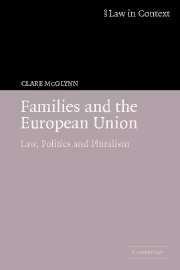Book contents
- Frontmatter
- Contents
- Preface
- Acknowledgments
- Table of cases
- Table of legislation and documents
- 1 Pluralism and human rights: a legal foundation for the regulation of families and family law in the European Union
- 2 Families, ideologies and value pluralism: towards an expanded concept of family
- 3 Children and European Union law: instrumentalism, protection and empowerment
- 4 Parenthood and European Union law: old ideologies and new ideals
- 5 European Union law and the regulation of intimate relationships: marriage, partnerships and human rights
- 6 The emergence of a European Union family law
- 7 Harmonisation, codification and the future of family law in the European Union
- Bibliography
- Index
7 - Harmonisation, codification and the future of family law in the European Union
Published online by Cambridge University Press: 04 July 2009
- Frontmatter
- Contents
- Preface
- Acknowledgments
- Table of cases
- Table of legislation and documents
- 1 Pluralism and human rights: a legal foundation for the regulation of families and family law in the European Union
- 2 Families, ideologies and value pluralism: towards an expanded concept of family
- 3 Children and European Union law: instrumentalism, protection and empowerment
- 4 Parenthood and European Union law: old ideologies and new ideals
- 5 European Union law and the regulation of intimate relationships: marriage, partnerships and human rights
- 6 The emergence of a European Union family law
- 7 Harmonisation, codification and the future of family law in the European Union
- Bibliography
- Index
Summary
Unity and diversity, and never one without the other – isn't that the very secret of our Europe?
Albert Camus[A] European civil code … will one day replace the Euro as the symbol of European integration.
Walter PintensUnity and diversity. That is indeed what Europe has been and should be about. At present, however, there is a grand debate taking place within the Union over just this theme. To be specific, the question is whether or not we should unify the private laws of Europe, effectively erasing the present diversity and pluralism. That is the extreme end of the debate, with more nuanced approaches focusing on harmonisation, as distinct from unification, and some speaking of a reform of ‘legal science’ such that harmonisation and perhaps unification will come about organically through the work of scholars, teachers and judges. While these debates were initially confined to the fields of tort, contract and commercial law, they are now a feature of family law discussions.
Despite the differences, what remains common to each of these approaches is the belief that some form of greater commonality, on a continuum from harmonisation to unification, is to be encouraged and welcomed. Existing shared norms, in the form of universal human rights principles, are not enough, but are indeed merely the basis, and for some the rationale, for greater assimilation.
- Type
- Chapter
- Information
- Families and the European UnionLaw, Politics and Pluralism, pp. 176 - 201Publisher: Cambridge University PressPrint publication year: 2006

